 Photo by Belize.com
Photo by Belize.com
Over the last several years as more people, organizations and governments began to take the prospect of global warming and human influenced climate change more seriously there has arisen a kind of 60 cycle background hum over the potential dangers of social unrest, disease, famine and mass movements of populations resulting from such change.
A few days ago while randomly browsing on the web I read an article at the Kansas City Star that sent a quick chill through my bloodstream: “Intelligence director: Worldwide economic crisis top U.S. security threat.
The story, by McClatchy writer Warren Strobel detailed remarks to congress made Monday by National Security Director Dennis Blair, who in a significant break with the Bush administration policy of treating terrorism and weapons proliferation as the greatest threats to national security, gave clues that new focus would center on the potential social unrest resulting from the world financial crisis.
Retired Navy Adm. Dennis Blair said the worldwide economic downturn could spawn political instability across the globe, hamper U.S. allies and drain support for the American-led international free-trading system.
“Time is probably our greatest threat,” Blair said in prepared remarks before the Senate Intelligence Committee. “The longer it takes for the recovery to begin, the greater the likelihood of serious damage to U.S. strategic interests.”
A day later the Washington Post’s Walter Pincus and Joby Warrick quoted Blair (in the same remarks to congress) as saying this:
“Roughly a quarter of the countries in the world have already experienced low-level instability such as government changes because of the current slowdown,”
The only good news in either article was quoted by the Star, with Blair telling the committee that:
“declining oil prices could “put the squeeze” on foreign policy “adventurism” by oil producers Iran and Venezuela.
I think he left out some major “foreign policy adventurers” with his omission of the US and western oil companies but I’m glad that he mentioned declining oil prices. That may tend to aid in the recovery in the short term, although they might, if allowed to continue downward, begin to haunt us by seriously retarding investment in non fossil fuel sources of energy.
As oil prices drop there is less incentive to conserve fuel, and less pressure on government and business to create opportunities for entrepreneurs in the alternative energy sector.
The continuing buzz about the increasing threats of drought, desertification, pandemic disease, famine, food riots, and water and other resource wars due to climate change driven by our profligate use of fossil fuels raises the specter of populations being forced by nature to migrate to cooler, wetter, climes and by economic necessity to move where the money is.
Just when I was considering retirement in Belize I’m discovering that by the time I get there my favorite bartenders will likely be living in Michigan.
At some point, in order to make existing and foreseeable alternate fuel technologies competitive with oil and as yet, non existent, “clean coal,” the price of a barrel of crude is going to have to be stabilized in the neighborhood of $70. (So I’m told by “experts.”)
No one is going to enjoy hearing that, but there it is. The pressure to keep prices in that area is already building and I think necessarily so. There will have to be put in place some system of “carbon credits or swaps” coupled with taxes on the use of fossil fuels in order to drive us where we are beginning to recognize, we need to go.
This process is going to be painful for everyone but the very wealthy and we will probably see a marked reduction in our standard of living over the next five to ten years in order to change the course and speed of this petroleum economy.
We have to move quickly in repairing and restructuring our economy (as well as the world’s), and creating new energy policies that move us away from diminishing sources that we know are becoming more dangerous and obsolete as time passes.
We must also become much more resourceful and local in how we grow and transport the world’s food, while at the same time finding new and more efficient energy solutions for sheltering 6 billion people.
There are some pretty tall orders to fill in our near future and I’m afraid that if we attack them with the same policies and practices of the last thirty years that led us to this precipice we are doomed to a long and possibly final fall.
Whew, I’m worn out just thinking about it, so get to work everybody, do your best and I’ll be watching (and hopefully cheering) your progress from my window seat at a little bar in San Pedro.
I hope the bartenders haven’t left yet.
Bob Higgins
Worldwide Sawdust




